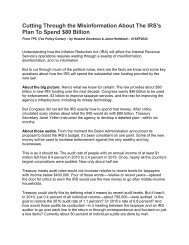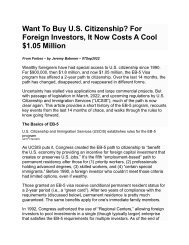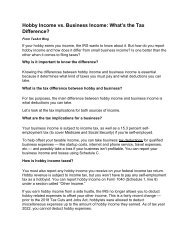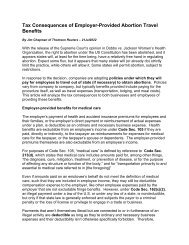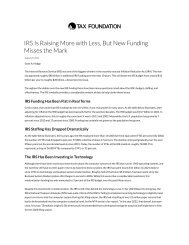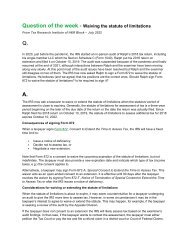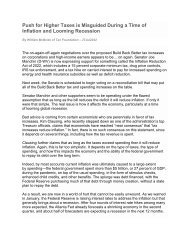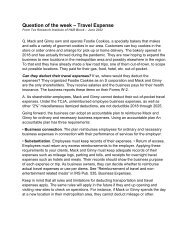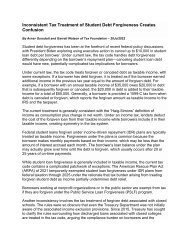Create successful ePaper yourself
Turn your PDF publications into a flip-book with our unique Google optimized e-Paper software.
<strong>Taxes</strong> <strong>On</strong> $1 Billion <strong>Mega</strong> <strong>Millions</strong> Jackpot May Be More Than<br />
You Think<br />
By Robert W. Wood of Forbes – 28Jul2022<br />
The <strong>Mega</strong> <strong>Millions</strong> jackpot has risen to $1.1 billion, up from $810 million. With eyepopping<br />
numbers, it’s easy to get lottery mania.<br />
<strong>Winning</strong> would be great, but <strong>the</strong> taxes are big too. Lottery winnings are taxed, with <strong>the</strong><br />
IRS taking up to 37%. Curiously, though, only 24% is withheld and sent directly to <strong>the</strong><br />
government. That means you may have to come up with as much as an extra 13% on<br />
your own when tax time comes. Then, depending on whe<strong>the</strong>r your state taxes lottery<br />
winnings, you may have to add state taxes too. Some people may even try to quickly<br />
move states, though it can be too late.<br />
You can take your winnings in a lump-sum cash payment, which would be about $602.5<br />
million, before taxes. Alternatively, you can be paid out in many annual payments — 30<br />
installments over 29 years. Ei<strong>the</strong>r way, you have to think about taxes.<br />
Just imagine magnifying <strong>the</strong> problem a hundred fold. Making sure that you can come up<br />
with that extra 13% is important. Since <strong>the</strong> tax withholding rate on lottery winnings is<br />
only 24%, note <strong>the</strong> big spread between 24% and 37%. Some lottery winners do not plan<br />
ahead, and can have trouble paying <strong>the</strong>ir taxes when <strong>the</strong>y file <strong>the</strong>ir tax returns <strong>the</strong><br />
year after <strong>the</strong>y win.<br />
There is also <strong>the</strong> cash versus annuity question. Whe<strong>the</strong>r lump sum or paid over time,<br />
taxes will come due.<br />
Apart from paying taxes, some lottery winners find that friends, family or co-workers<br />
might expect share of <strong>the</strong> loot. Office pools, informal understandings, and casual deals<br />
to split winnings can all bring trouble, tax and o<strong>the</strong>rwise.<br />
It might start with an innocent comment that someone says was an oral agreement.<br />
After all, remarks about splitting winnings can be misinterpreted. Some winners face<br />
lawyer fees for defending against <strong>the</strong> claims, and <strong>the</strong> fallout from lottery lawsuits can be<br />
messy.<br />
For one thing, claims by co-workers, former spouses and o<strong>the</strong>rs who say <strong>the</strong>y deserve<br />
a share can tie up <strong>the</strong> money for years, so be careful what you say and to whom. <strong>On</strong>e<br />
case upheld a 20-year-old oral agreement to split lottery winnings. Some suits over<br />
lottery winnings are with co-workers and (former) friends. Some disputes are with family<br />
members or with <strong>the</strong> IRS.
In Dickerson v. Commissioner, an Alabama Waffle House waitress won a $10 million<br />
lottery jackpot on a ticket given to her by a customer. The trouble started when she tried<br />
to benefit her family and to spread <strong>the</strong> wealth. The IRS said she was liable for gift taxes<br />
when she transferred <strong>the</strong> winning ticket to a family company of which she owned 49%.<br />
The waitress fought <strong>the</strong> tax bill, and eventually landed in Tax Court. But <strong>the</strong> court<br />
agreed with <strong>the</strong> IRS, so she lost.<br />
Some tax advice before <strong>the</strong> plan might have avoided <strong>the</strong> extra tax dollars, generated<br />
because her tax plan was half-baked. In short, she shouldn’t have assigned her claim in<br />
a waffle house.<br />
Time and again, lottery winners have trouble paying <strong>the</strong>ir taxes and resolving disputes.<br />
The stakes and tax problems can grow larger on bigger lottery prizes.<br />
With $1 billion at stake, creative claims could arise. And <strong>the</strong> usual tax problems on<br />
winnings can get even more complex. Unless <strong>the</strong>re is a tax partnership, a winner may<br />
be taxed on it all, yet only be allowed a partial write-off for <strong>the</strong> damages paid to those<br />
claiming a share. In fact, <strong>the</strong> tax rules for litigants are complex, made more so by 2018<br />
tax changes. How legal settlements are taxed is tricky, and some plaintiffs have to pay<br />
on <strong>the</strong>ir attorney’s fees too.<br />
Plainly, winning would be awfully nice, but just be careful if you do.



